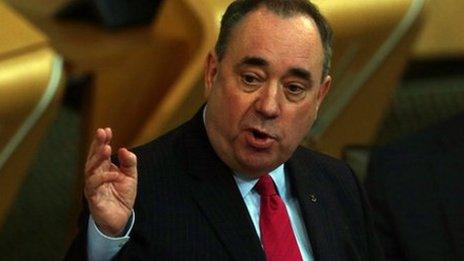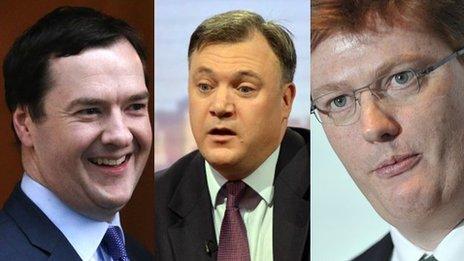Scottish independence: Alex Salmond hits back over currency union
- Published

Mr Salmond said an independent Scotland would want to assume its share of the UK's assets and debts
Scotland's first minister has accused the three main UK parties of "bluff, bluster and bullying" over their opposition to a currency union with an independent Scotland.
Alex Salmond was speaking after UK Chancellor George Osborne said a vote for Scottish independence would mean walking away from the pound.
Mr Osborne's position was echoed by Labour and the Liberal Democrats.
But Mr Salmond said the move would "backfire spectacularly".
The referendum on Scottish independence will be held on 18 September, with voters being asked the Yes/No question: "Should Scotland be an independent country?"
In a statement made in Edinburgh on Thursday morning, Mr Osborne said: "If Scotland walks away from the UK, it walks away from the UK pound."
The chancellor also released a report from the most senior civil servant at the Treasury, Sir Nicholas Macpherson, which said currency unions were "fraught with difficulty".
Sir Nicholas "strongly" advised against a currency union with an independent Scotland "as currently proposed".
The Scottish government has argued that keeping the pound and the services of the Bank of England as part of a currency union under independence made sense for both Scotland and the rest of the UK.
But Mr Osborne, Labour shadow chancellor Ed Balls and Lib Dem Chief Secretary to the Treasury Danny Alexander all said they could not recommend such a plan.
'New tax'
Mr Salmond said the three pro-union politicians were guilty of "bluff because what they say now and what they say the day after a "Yes" vote are two entirely different things.
"Bluster because we are expected to believe that the Osborne idea is to tell business in England next year at the UK general election that he wants to impose a new tax on them of several hundred million pounds for the privilege of exporting their goods to Scotland.
"And bullying because the days of Westminster politicians dictating to Scotland are over. In fact one of my predecessors, former First Minister Henry McLeish, who is still a 'No' voter at this stage, has described it as threatening behaviour.
"So I think it will backfire spectacularly on the unionist politicians involved".

Chancellor George Osborne, Labour Shadow Chancellor Ed Balls and Liberal Democrat Chief Secretary to the Treasury, Danny Alexander, want to block a currency union
One of the concerns raised by Sir Nicholas in his advice to Mr Osborne was that an independent Scotland might only take sterling for a short period of time.
But Sir Nicholas suggested that, if an independent Scotland committed to a longer-term currency union, his advice might be different.
When asked whether he would commit to taking sterling for 40 or 50 years, Mr Salmond said the Scottish government would be "very happy indeed" to negotiate the guidelines for a currency union now, but said Whitehall had "refused to pre-negotiate on anything".
Mr Salmond said the Scottish government continued to propose that an independent Scotland should assume a share of both the assets and the debts of the UK.
Speaking in Edinburgh on Thursday, Mr Osborne said: "The pound isn't an asset to be divided up between two countries after a break-up like a CD collection."
In addition, Mr Balls said: "Alex Salmond is saying to people that you can have independence and keep the pound and the Bank of England - that is not going to happen".
In a letter sent to the first minister on Friday, Mr Alexander called on the Scottish government to set out an alternative currency proposal "as a matter of great urgency".
He argued that matters surrounding the currency were of the "utmost importance" and that "a failure to set out an alternative will deny our fellow citizens the information they need to make a rational decision based on facts and evidence".
Mr Alexander's letter continued: "The confidence of many people and of much of the business community will be shaken if it transpires that no such alternative plans have been drawn up with the referendum now only a few months away."
Pressed by BBC radio's Good Morning Scotland programme on whether he had an alternative plan, Mr Salmond said the Scottish government's fiscal working group, led by Nobel laureate economists Joseph Stiglitz and Sir James Mirlees, set out the currency options for an independent Scotland and recommended that the best option was a sterling area.
He said he would continue to argue for that currency union "with great conviction", pointing out the advantages to Scotland and the rest of the UK as well as the "misrepresentations" by his political opponents.
'Badge of sovereignty'
Mr Salmond said: "We will continue to articulate that because we think the Unionist position will fragment because it is against the interests of Scotland and against the interests of business in the rest of the UK.
"Business does not want to pay transaction costs to trade with Scotland and it won't have to under our sterling area proposal."
He said that, after America, Scotland was the second biggest purchaser of England's goods and not having a currency union could cost business hundreds of millions of pounds in transaction charges.
The first minister said: "That's why common sense will prevail on Messrs Osborne and Balls once the politicking is over, they have lost the referendum and have to come to terms with reality."
Independence campaigner and former SNP deputy leader Jim Sillars told the programme he was encouraged that Alex Salmond had not dismissed the possibility of a Scottish currency.
He said: "Currency is a badge of sovereignty. I want a Scottish currency that the Scottish government can actually control."
Mr Sillars said even if Mr Salmond did not believe the unionists parties when they ruled out a currency union he should tell the Scottish people there is a very good alternative.
He said it was a "perfectly reasonable and rational position to have a Scottish currency".